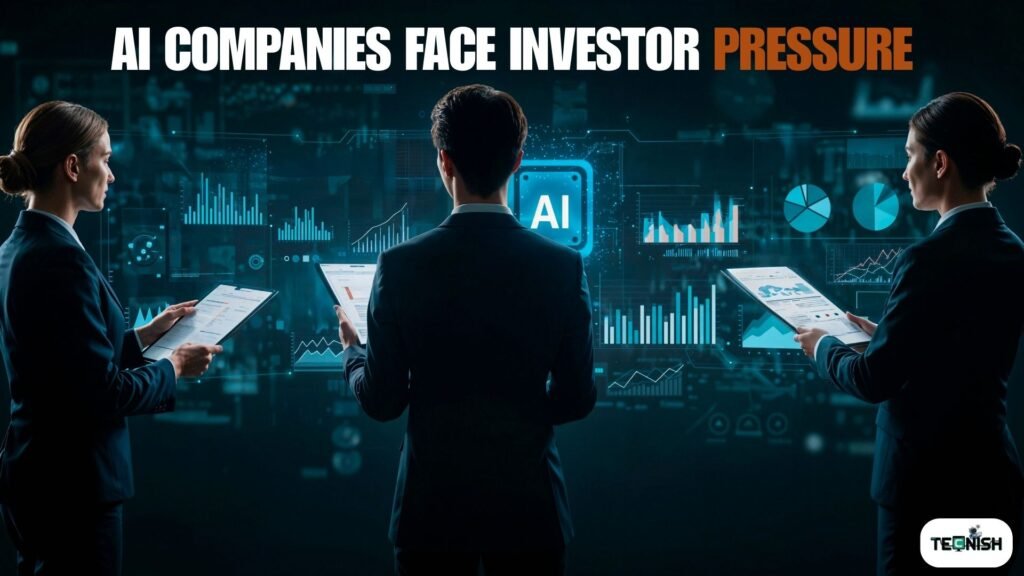The world of Artificial Intelligence (AI) has been one of the most exciting areas in tech over the last few years. From smarter chatbots to AI doctors, startups promised to reshape daily life. But in 2025, the story has shifted. AI Companies Face Investor Pressure like never before, reshaping the industry.
Investors, who poured billions into AI, are running out of patience. They want profits and quickly. According to Crunchbase, In Q2 2025, global startup funding hit $91 billion, dropping almost 20% compared to the previous quarter. This signals a clear artificial intelligence market slowdown.
Think of it like planting a tree years of effort, but only tiny fruits. That’s how many investors see AI right now.
Why Are Investors Worried About AI Companies?

Investor pressure means demanding answers to questions like:
- When will profits come?
- Is spending sustainable?
- Is AI worth billions?
The problem: building AI is extremely expensive. Running advanced systems requires costly chips, huge computing power, and skilled engineers. Yet, most revenue doesn’t match these expenses thats why AI Companies Face Investor Pressure.
This mismatch is one of the biggest AI industry challenges 2025. While millions use AI tools, few actually pay for them. As Reuters notes, investors are no longer satisfied with promises—they want proof.
The Hype vs Reality in the AI Market

In 2023–2024, AI looked unstoppable. Stock prices soared, and headlines promised AI would transform everything. But in 2025, reality looks different: many AI tools are costly, error-prone, or impractical.
As a result, AI company stock performance has dipped. Shares that once skyrocketed are falling because valuations don’t match profits. The hype has faded, and investors are recalculating expectations.
Funding Problems Hit AI Startups Hard
During the boom, venture capital poured into AI. However, in 2025, worries about AI funding are becoming significant. Startups are grilled with tough questions:
- How will you make money?
- When will you break even?
- Why should we invest in you?
Many smaller startups can’t answer these, leaving them without funding. Meanwhile, tech giants like Microsoft and Google can afford to keep spending. As BestBrokers reports, 2025 saw the fewest AI startup deals since 2017, even as large mega-rounds continued.
Competition in the AI Market is Fierce

For AI Companies Face Investor Pressure too many companies are chasing the same goals. Giants like Google, Amazon, and Microsoft compete with hundreds of startups. When everyone sells “lemonade,” profits spread too thin.
This AI market competition forces investors to be selective. Only companies with unique technology or strong business models stand a chance.
Stock Market Signals Trouble
Stocks once inflated by AI hype are now falling. Thats why AI Companies Face Investor Pressure. High valuations don’t reflect actual earnings. Investors are less patient with risky bets.
Key reasons for trouble:
- Declining AI stock prices
- Overvalued companies
- Rising skepticism
This is a warning sign: AI company valuation challenges will continue until firms prove profitability.
Are AI Companies Actually Making Money?

For most, the answer is no. Running AI systems requires huge energy, hardware, and labor costs. Yet, subscriptions and user payments rarely cover expenses.
This creates AI companies profitability issues, where growth outpaces income. Investors are pressing harder: “Show profits or risk losing support.”
The Future of AI Investments – What’s Next?

The good news: investors aren’t abandoning AI. They’re becoming smarter. According to DealMaker.Tech, the focus is shifting toward companies with clear revenue paths.
Future bets will prioritize:
- Industry specialization (healthcare, finance, education)
- Lower infrastructure costs
- Selective funding for proven ideas
- Partnerships between startups and big firms
The storm is tough now, but AI investment could bounce back leaner and more focused.
Lessons for the Tech World
The story of why AI Companies Face Investor Pressure offers lessons:
- Don’t over-promise.
- Build sustainable business models.
- Expect shakeouts in crowded markets.
Other tech sectors, from blockchain to VR, should take note.
What This Means for You
For everyday users, investor pressure means:
- Slower updates and fewer experimental features
- Higher subscription costs
- More reliable, practical tools
AI isn’t disappearing it’s evolving. The flashy boom years are giving way to a more sustainable phase.
For deeper coverage on AI and robotics, explore Tecnish’s AI & Robots section. And if you’re curious about broader shifts in the tech world, check out the latest insights on the Tecnish Tech Blogs hub.
Key Takeaways
- Artificial intelligence market slowdown shows investor excitement cooling.
- AI companies profitability issues remain unsolved.
- AI funding concerns are forcing startups to adapt.
- AI market competition ensures only the strongest survive.
- The future of AI investments lies in focused, practical applications.
Conclusion – Can AI Companies Win Back Trust?
Yes, but only with balance. The last two years were about hype. 2025 is about proving value. Investor pressure may feel harsh, but it’s healthy, it forces companies to focus on real results.
AI is still a transformative technology. The difference now is that the industry must shift from flashy promises to sustainable growth. For users, that means fewer gimmicks and more reliable, useful tools.
FAQs About AI Companies Facing Investor Pressure
1. What does “investor pressure” mean?
It means investors are demanding profits instead of just supporting big ideas.
2. Why is the AI market slowing in 2025?
Because costs are high, profits are slow, and too many firms compete in the same space.
3. Will AI companies recover?
Yes, but only those with strong business models and realistic strategies.
4. How does competition affect startups?
Fierce competition makes survival harder for smaller firms.
5. Should people still trust AI?
Yes.AI is still powerful. The business challenges don’t erase its usefulness.
For more insightful news, visit Tecnish





